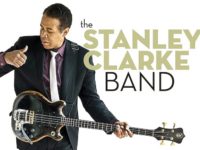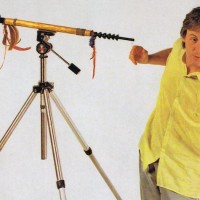Stanley Clarke’s Up is an utterly welcome throwback, a fizzy reminder of everything that made his 1970s-era solo albums great — from his utilization of both the electric and the acoustic bass to the project’s deep well of complementary and sometimes surprising guest stars.
That’s the way it was with projects on 1975’s Journey to Love and 1979’s I Wanna Play For You, both of which featured Jeff Beck. With Up, just out on Mack Avenue, we find Clark working with Joe Walsh (the James Gang, the Eagles), Stewart Copeland (the Police), Lenny Castro (Boz Scaggs, Toto, Fleetwood Mac), Jimmy Herring (Widespread Panic) and Greg Phillinganes (Eric Clapton, Toto), along with more expected figures like Clarke’s longtime Return to Forever bandmate Chick Corea, Jimmy Herring, Paul Jackson Jr. and others.
And so we have “Pop Virgil,” a warm and inviting blues-inflected opener powered by Michael Jackson’s rhythm section. And a title track featuring the thwackingly fleet drumming of Copeland, and these shaggy-dog asides from Walsh. But also “Last Train to Sanity,” with the Harlem String Quartet. And “Brazilian Love Affair” and “Bass Folk Song No. 13: Mingus,” touching tributes to the late George Duke and Charles Mingus, respectively. “Trust” and the closing “La Cancion de Sofia,” the latter of which features Corea in a delicate duo format, speak to more personal emotions, as well — dedicated, as they are, to Clarke’s daughter and wife, respectively.
All of this speaks to a different time, when genres weren’t pegged as square or round, when imaginations roamed free across boundaries — a period that Clarke once helped define.
“With Return to Forever, Billy Joel was a huge fan of Chick Corea,” he tells me, in an exclusive Something Else! Sitdown. “Elton John used to come to see us when I would come to England; he would let us use his Rolls Royce. There were all these kind of stories. You don’t see so much of it now, because there are bigger partitions between the genres of music. I think it has to do with the managers, and the business. They want to keep everything separate. Most of my friends were rock musicians or funk musicians.”
He makes the connection more directly with a risky redo of 1976’s “School Days,” a signature moment of Clarke’s rightly named bass liberation movement. With this, he would set a new template for the way the instrument was approached, performing both the typical foundational role but also as an innovative soloist. Many radio listeners, at that time, were familiar with Larry Graham’s slap technique from his work with Sly and the Family Stone — but Clarke incorporated it into the structure of the song. He had effectively opened the door for bassist to become band leaders.
Almost 40 years later, and after a period firmly dedicated to more acoustic sounds, Clarke succeeds again in the way he did long ago — throwing a curveball by featuring an angular and assertive Herring on guitar on this “School Days” update. Gerry Brown, the drummer on Clarke’s original take, helps hold down the bottom — even as Clarke tangles brilliantly with his offbeat foil. It’s new, but at the same time, reminiscent of everything that’s always made Clarke such an intriguing figure in music.
“Still to this day, I’m going over to Stewart Copeland’s house and we hang out,” he tells us. “I think it was more common back then. It’s a shame that it doesn’t happen as much now. I don’t want to say that musicians were better back then. Maybe they were, or maybe it was just an attitude. They were more flexible. Who knows? Maybe it will come back.”
Clarke’s doing his level best on Up to make sure of it.
- Nick DeRiso’s Best of 2015 (Rock + Pop): Death Cab for Cutie, Joe Jackson, Toto + Others - January 18, 2016
- Nick DeRiso’s Best of 2015 (Blues, Jazz + R&B): Boz Scaggs, Gavin Harrison, Alabama Shakes - January 10, 2016
- Nick DeRiso’s Best of 2015 (Reissues + Live): John Oates, Led Zeppelin, Yes, Faces + others - January 7, 2016




